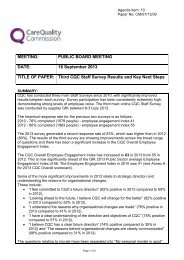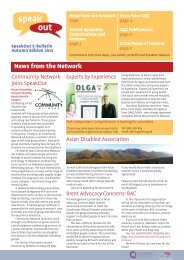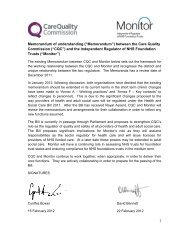Whistleblowing: Guidance for providers who are registered with CQC
Whistleblowing: Guidance for providers who are registered with CQC
Whistleblowing: Guidance for providers who are registered with CQC
You also want an ePaper? Increase the reach of your titles
YUMPU automatically turns print PDFs into web optimized ePapers that Google loves.
5<br />
The law<br />
6<br />
Where can I get advice on the best way to respond to<br />
concerns from staff and providing my own whistleblowing<br />
policy?<br />
The charity Public Concern at Work offers advice to employers as well as<br />
workers. Its website includes helpful frequently asked questions (FAQs) <strong>for</strong><br />
employers and a consultancy service. See www.pcaw.co.uk/index.htm.<br />
You may also find it helpful to look at the guide ‘Speak up <strong>for</strong> a healthy<br />
NHS’, which was commissioned by the NHS Social Partnership Forum and<br />
written by Public Concern at Work. It is aimed at helping NHS<br />
organisations achieve best practice whistleblowing arrangements and<br />
create a culture where staff can speak up safely, but the guidance has lots<br />
of useful advice that may be applicable to all <strong>providers</strong>. It is available at<br />
www.pcaw.co.uk/policy/policy_pdfs/SpeakupNHS.pdf.<br />
Who is protected by PIDA?<br />
PIDA provides protection <strong>for</strong> people <strong>who</strong> can make protected disclosures.<br />
These people <strong>are</strong>:<br />
• Workers <strong>who</strong> <strong>are</strong> directly employed by the <strong>registered</strong> provider.<br />
• Workers <strong>who</strong> have left their job after making a protected disclosure.<br />
• Other workers <strong>who</strong> provide services to the <strong>registered</strong> provider.<br />
Examples <strong>are</strong> agency staff, visiting community health staff, GPs,<br />
independent activities organisers, contractors, visiting hairdressers and<br />
volunteers. This is not a complete list – there will be other types of<br />
workers that provide services to a <strong>registered</strong> provider.<br />
If a worker makes a disclosure after they leave their job, they may be<br />
protected by PIDA. They may wish to take legal advice to clarify this or talk<br />
to the charity Public Concern at Work. Their website provides advice to<br />
workers and employers: www.pcaw.co.uk/index.htm. Public Concern at<br />
Work also offers consultancy services to employers.<br />
<strong>CQC</strong> cannot give legal advice to workers or employers. We have provided<br />
this document as guidance only – it is not legal advice.<br />
Other people <strong>who</strong> <strong>are</strong> not workers can raise concerns about a service <strong>with</strong><br />
the provider of the service or <strong>with</strong> organisations such as <strong>CQC</strong>, but PIDA does<br />
not cover such disclosures and this is not called ‘whistleblowing’.<br />
PoC 100495 2.00 <strong>Whistleblowing</strong>: <strong>Guidance</strong> <strong>for</strong> <strong>providers</strong><br />
<strong>who</strong> <strong>are</strong> <strong>registered</strong> <strong>with</strong> the C<strong>are</strong> Quality Commission 5

















